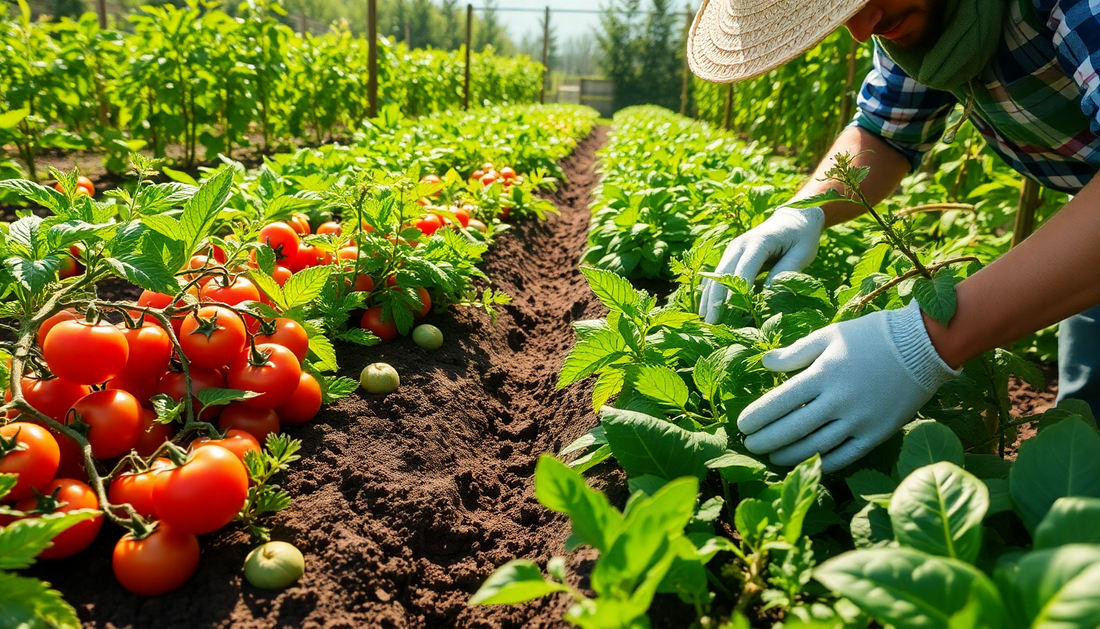
The Best Way to Fertilize Vegetables for Maximum Yield
Share
As a passionate gardener, I've always been fascinated by the art of growing healthy, bountiful vegetables. One of the key factors in achieving this is proper fertilization. In this comprehensive blog post, I'll share with you the best way to fertilize your vegetables for maximum yield.
Understanding Vegetable Nutrient Needs
Vegetables, like any living organism, require a delicate balance of essential nutrients to thrive. The three primary macronutrients are nitrogen (N), phosphorus (P), and potassium (K), often referred to as the "NPK" ratio. Each of these nutrients plays a crucial role in the growth and development of your vegetable plants.
Nitrogen is responsible for promoting lush, green foliage and overall plant vigor. Phosphorus aids in root development, flowering, and fruit production. Potassium helps with disease resistance, drought tolerance, and overall plant health.
In addition to these macronutrients, vegetables also require various micronutrients, such as calcium, magnesium, sulfur, iron, and boron, in smaller quantities. Understanding the specific nutrient needs of the vegetables you're growing is the first step in creating a successful fertilization plan.
Developing a Vegetable Fertilization Schedule
Creating a comprehensive fertilization schedule is essential for maximizing your vegetable yield. This schedule should take into account the growth stages of your plants and the specific nutrient requirements at each stage.
Soil Preparation
Before planting, it's crucial to amend your soil with organic matter, such as compost or well-rotted manure. This will improve soil structure, water-holding capacity, and overall nutrient availability. Additionally, you can conduct a soil test to determine the existing nutrient levels and pH of your soil, allowing you to make targeted adjustments.
Planting and Early Growth
At the time of planting, apply a balanced, slow-release organic fertilizer or a combination of organic and mineral fertilizers. This will provide a steady supply of nutrients as your plants establish their root systems and begin to grow.
Mid-Season Fertilization
As your vegetables start to mature and produce, they'll require additional nutrients to sustain their growth and fruit production. Apply a side-dressing of a high-nitrogen fertilizer, such as blood meal or fish emulsion, every 4-6 weeks. This will help maintain lush foliage and encourage continued fruit development.
Flowering and Fruiting
During the flowering and fruiting stages, your vegetables will need a fertilizer that is higher in phosphorus and potassium to support bud formation, pollination, and fruit development. You can use a balanced organic fertilizer or a specialized "bloom booster" formula.
Harvesting and Post-Harvest
After each harvest, apply a light layer of compost or a balanced organic fertilizer to replenish the nutrients that were removed from the soil. This will help maintain soil fertility and prepare your garden for the next growing season.
Choosing the Right Fertilizers
When it comes to selecting the right fertilizers for your vegetables, there are several options to consider:
Organic Fertilizers
Organic fertilizers, such as compost, manure, bone meal, and blood meal, provide a slow, steady release of nutrients that mimic the natural nutrient cycling in the soil. These fertilizers also improve soil structure and support a healthy microbial community.
Mineral Fertilizers
Mineral fertilizers, like synthetic NPK blends, offer a more immediate nutrient boost but may not provide the long-term soil-building benefits of organic options. These can be useful as a supplement to your organic fertilization program.
Foliar Sprays
Foliar sprays, which are applied directly to the leaves, can be a helpful way to address specific nutrient deficiencies or provide a quick boost during critical growth stages. These are best used as a complement to your soil-based fertilization program.
Maximizing Vegetable Yield with Proper Fertilization
By following a well-planned vegetable fertilization schedule and using a combination of organic and mineral fertilizers, you can unlock the full potential of your vegetable garden. Remember, the key is to provide the right nutrients at the right time, tailored to the specific needs of the vegetables you're growing.
With a little bit of knowledge and some dedicated care, you'll be on your way to harvesting an abundant, nutrient-rich crop that will nourish both your body and your soul. Happy gardening!
